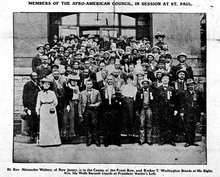Timothy Thomas Fortune
Timothy Thomas Fortune | |
|---|---|
Republican | |
| Spouse |
Carrie Smiley (m. 1878) |
| Children | 5 |
Timothy Thomas Fortune (October 3, 1856 – June 2, 1928) was an American orator, civil rights leader, journalist, writer, editor and publisher. He was the highly influential editor of the nation's leading black newspaper The New York Age and was the leading economist in the black community. He was a long-time adviser to Booker T. Washington and was the editor of Washington's first autobiography, The Story of My Life and Work.[1] Fortune's philosophy of militant agitation on behalf of the rights of black people laid one of the foundations of the Civil Rights Movement.
Early life
Timothy Thomas Fortune was born into slavery
Although he was mostly self-taught prior to his college enrollment in 1875, Fortune was admitted to study law. He changed his major to journalism after two semesters before leaving school altogether to begin work, in 1876, at the People's Advocate, a newspaper in Washington, D.C. On February 21, 1878, Fortune married Carrie C. Smiley (née Caroline Charlotte Smiley; 1860–1940) in Washington, D.C.[4]
New York journalist
Fortune moved to
Upon arrival in New York, Fortune began working as a printer, and worked at The Weekly Witness. In 1880 he became journalist and editor of The Rumor, run by George Parker and William Walter Sampson. This journal soon changed its name to The New York Globe.[4] The Globe closed in November 1884 after a dispute with co-editor William B. Derrick,[5][page needed] and one week later, on November 22, Fortune published the first issue of his New York Freeman. In the late 1880s, he was considered the greatest black newspaper writer in America.[4] That same year he published a book entitled Black and White: Land, Labor, and Politics in the South that, along with his 1885 pamphlet, The Negro in Politics, openly challenged Frederick Douglass's dictum that "the Republican Party is the ship, all else the open sea". In 1885, The Freeman took the new name of The New York Age[3] and set out to become "The Afro-American Journal of News and Opinion".[citation needed] In 1890 Fortune was elected chairman of the executive committee of the National Afro-American Press Association at their meeting in Indianapolis.[3]

In Chicago on January 25, 1890, Fortune co-founded the
With Fortune at the helm as co-owner with Emanuel Fortune Jr. and Jerome B. Peterson, the New York Age became the most widely read of all Black newspapers. It stood at the forefront as a voice agitating against the evils of
In
Negro World
Fortune went to work as an editor at the Universal Negro Improvement Association and African Communities League's house organ, the Negro World, in 1923. Its circulation, at its height, was more than 200,000. With distribution throughout the United States, Canada, Europe, Africa, the Caribbean and Central America.[citation needed]
Fortune rubbed shoulders with such literary luminaries as
Later life
Fortune moved to Red Bank, New Jersey, in 1901, where he built his home, Maple Hall.[7] The house was placed on the National Register of Historic Places on December 8, 1976, and the New Jersey Register of Historic Places on August 16, 1979.[8]
Fortune died in 1928 at the age of 71 in Philadelphia, Pennsylvania and is interred at Eden Cemetery in Collingdale, Pennsylvania.[9]
References
- ^ Charlotte D. Fitzgerald, "The Story of My Life and Work: Booker T. Washington’s Other Autobiography," The Black Scholar (2001) 21#4, pp. 35–40.
- ^ "Biographies: T. Thomas Fortune". PBS.
- ^ a b c d e Culp, Daniel Wallace (1902). Twentieth century Negro literature; or, A cyclopedia of thought on the vital topics relating to the American Negro. Atlanta: J. L. Nichols & Co. p. 226.
- ^ a b c d e Irvine Garland Penn, The Afro-American Press and Its Editors, Willey & Company, 1891, pp. 133–138.
- ^ Boyd, Herb (March 1991). "The Black Press: A Long History of Service and Advocacy". Crisis. Vol. 98, no. 3.
- ^ Justesen, Benjamin R. Broken Brotherhood: The Rise and Fall of the National Afro-American Council, SIU Press, 2008, p. 82.
- ^ Horner, Shirley. "About Books", The New York Times, October 3, 1993. Accessed April 30, 2023. "Timothy Thomas Fortune, a pioneering black journalist, who went on to start The New York Age, once the nation's leading black newspaper, moved to Red Bank in 1901. His Red Bank home, W. Burgen place, is a National Historic Landmark."
- ^ New Jersey and National Registers of Historic Places: Monmouth County, New Jersey Department of Environmental Protection Historic Preservation Office, updated March 30, 2023. Accessed April 30, 2023.
- ^ Renewed Efforts To Save Home Of Journalist T. Thomas Fortune
Sources
- Curry, Tommy J. "The Fortune of Wells: Ida B. Wells-Barnett’s Use of T. Thomas Fortune’s Philosophy of Social Agitation as a Prolegomenon to Militant Civil Rights Activism," Transactions of the Charles S. Peirce Society: A Quarterly Journal in American Philosophy (2012), 48#4, pp. 457–82 in Project MUSE
- Nelson, Claudia D. "The Men that Influenced Ida B. Wells-Barnett: Jim Wells, T. Thomas Fortune, and Frederick Douglass," Making Connections: A Journal for Teachers of Cultural Diversity (2006), 10#1, pp. 25–44.
- Thornbrough, Emma Lou. T. Thomas Fortune: Militant Journalist (1972), the standard scholarly biography
Primary sources
- Alexander, Shawn, ed. T. Thomas Fortune, the Afro-American Agitator: A Collection of Writings, 1880-1928 (2010)
External links
- Soldiers without Swords Biographies
- Tuskegee's point-man, Timothy Fortune
- Ida B. Wells-Barnett
- The Reader's Companion to American History
- T. Thomas Fortune House
- Letter from T. Thomas Fortune to George Myers
- After Reconstruction: Problems of African Americans in the South
- An Army of Lions: The Civil Rights Struggle Before the NAACP
- Works by Timothy Thomas Fortune at Project Gutenberg
- Works by or about Timothy Thomas Fortune at Internet Archive
- Works by Timothy Thomas Fortune at LibriVox (public domain audiobooks)

